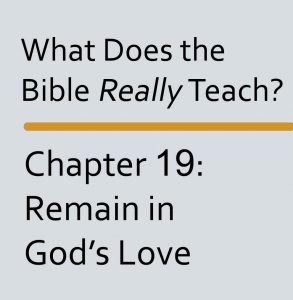With the Watchtower’s emphasis on works, it’s not surprising that the title of the last chapter of the book comes from a partial quotation from Jude 21—“Remain in God’s Love.”
Paragraph 3 (pp. 184-185) says, “How can we make Jehovah our refuge? We need to trust in him. Furthermore, God’s Word urges us: ‘Keep yourselves in God’s love.’ (Jude 21)”
Ask the Witnesses to read the context in Jude 20-23: “But you, beloved ones, build yourselves up on your most holy faith, and pray with holy spirit, in order to keep yourselves in God’s love, while you await the mercy of our Lord Jesus Christ with everlasting life in view. Also, continue showing mercy to some who have doubts; save them by snatching them out of the fire. But continue showing mercy to others, doing so with fear, while you hate even the garment that has been stained by the flesh.”
Point out the irony of the Watchtower quoting from a trinitarian proof text which also refers to snatching people “out of the fire”!
If you think it would be helpful at this juncture, use those verses in conjunction with The Holy Spirit is God Approach (p. 197) and The Justice for the Wicked Approach (pp. 256-263) from my book, Getting Through to Jehovah’s Witnesses: Approaching Bible Discussions in Unexpected Ways.
A key failing of a works-salvation system such as the one the Watchtower teaches is that it gives the impression that God’s love is conditional—that he will loves us if we perform well and not love us if we don’t.
That’s not what Jude 21 means. In Jesus’ parable, the father never stopped loving the prodigal son, but the prodigal son wasn’t experiencing his love because he ran off to pursue sinful pleasures. The father never stopped loving the elder brother, but he wasn’t experiencing his love. He saw his life as requiring constant service to his father. He refused to join the celebration when his wayward brother returned.
What should we appreciate about Jehovah’s love?
Paragraphs 4-5 (p. 185) give a list of things we should appreciate regarding Jehovah’s love for us (I’ll cite the paragraphs after each point):
- He provided an abundant and beautiful earth (4)
- He revealed his name and qualities to us (4)
- He provided his own Son’s ransom sacrifice (4)
- He established a heavenly Kingdom government (5)
- This Kingdom will soon make the earth a paradise (5)
- He told us the best way to live now (5)
- He given us the gift of prayer (5)
Notice what it leaves out. Because of the Watchtower’s works-salvation system and its two-class teaching, the book doesn’t mention that God:
- Has declared Christians righteous by faith apart from works (Romans 4:6)
- Has brought Christians from spiritual death to spiritual life (Colossians 2:13)
- Has forgiven Christians all of our sins (Colossians 2:13)
- Has canceled Christians’ sin debt based on Christ’s sacrifice (Colossians 2:14)
- Has delivered Christians from the domain of darkness and transferred us to the kingdom of his beloved Son (Colossians 1:13)
- Has caused Christians to be born again to a living hope through the resurrection of Jesus Christ from the dead (1 Peter 1:3)
- Has given Christians an imperishable inheritance, undefiled unfading, and kept in heaven (1 Peter 1:4)
Each of those scriptures can provide a fruitful area for discussion. For best effect, I recommend that you have the Witnesses read the verse aloud and then ask them to give you their understanding of its meaning. Ask as many follow-up questions as you need to in order to draw out the actual meaning. Be sure to draw their attention to the verb tenses. These are gifts God has already graciously given Christians based on Christ’s sacrifice. They aren’t contingent on future performance.
Next time, we’ll look at what the Bible says about our need for an inner transformation.


Leave a Reply
Be the First to Comment!